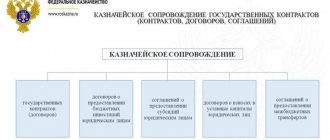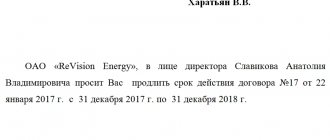Home / Government procurement / Federal Law 44
Back
Published: 05/04/2019
Reading time: 5 min
0
969
Despite the fact that the procedure for concluding a government contract is quite lengthy and is preceded by a number of organizationally complex stages, after signing the contract the parties may need to terminate the contract through conciliation. This opportunity is reserved for them in Part 8 of Art. 96 44-FZ.
- In what cases is it permissible to terminate a contract by agreement of the parties?
- Termination procedure
- The procedure and timing for posting information in the UIS
- Drawing up an agreement
- Consequences of termination
Content:
1. Termination of the contract by agreement of the parties 1.1 Rules for drawing up an additional agreement on termination 2. Unilateral procedure for terminating obligations 2.1 Reasons for unilateral termination of cooperation on the part of the contractor 2.2 Reasons for unilateral termination of cooperation on the part of the customer 3. Termination of the contract in court 4. Recommendations to suppliers
Termination of contract by agreement of the parties
It is possible to terminate obligations by mutual agreement in the manner provided for in Part 8 of Article 95 of 44-FZ. However, the legislation does not say anything about the procedure itself and the rules for its implementation. To understand how to act correctly in this case, you should refer to the Civil Code of the Russian Federation and delve into all the details.
Civil legislation allows the termination of obligations by mutual consent, even if such a possibility was not previously agreed upon in the text of the contract (Part 1 of Article 450 of the Civil Code of the Russian Federation). 44-FZ also does not say anything that this condition must be indicated in the contract. Therefore, if the customer refers to the impossibility of terminating the contract due to failure to include this condition in the text, he is mistaken and acts unlawfully.
Obligations can be terminated only in a number of cases, which are mentioned in Article 451 of the Civil Code of the Russian Federation. The circumstances leading to this must be significant. That is, such that if they had arisen earlier, the parties would not have entered into a contract at all.
- The contractor is unable to fulfill the contract for reasons beyond his control (force majeure): floods, earthquakes, wars, snow storms, etc. Force majeure are circumstances that negatively affect the performance of equipment, machinery, communications, etc.
- The customer no longer needs the agreed goods or works.
- Fulfillment of obligations is impossible due to the influence of external factors.
- The customer did not receive money from the state budget, which is why he is unable to pay for supplies or work.
- The customer did not select the entire quantity of goods within the agreed period.
- The contractor cannot fulfill his obligations within the specified period, and the customer does not mind refusing the contract.
Important point! The Ministry of Economic Development of the Russian Federation, in its letter dated January 16, 2017 No. D28i-130, reports that partial termination of the contract is not allowed. If not all goods are delivered, the customer accepts and pays for the actual volume delivered.
Example: A medical institution entered into an agreement for the supply of medicines in several stages. At some point, the customer refused to accept the goods, as there was an oversupply in the warehouse, and suggested that the contractor terminate the obligation unilaterally. However, the customer has no right to demand this. He must complete the work, or terminate the entire contract by agreement and pay for the completed part of the work.
Thus, if the parties decide to terminate the contract, then the absence of this condition in the text should not prevent them. The only thing you need to worry about is getting it in writing in accordance with Article 452 of the Civil Code of the Russian Federation. Also, in accordance with Article 103 44-FZ, the customer’s responsibility will be to enter information into the register of contracts in the Unified Information System within 5 days after the conclusion of the agreement.
It should be noted that after the termination of obligations by mutual consent of the parties, mutual cooperation ends. After this, the customer cannot include information about the contractor in the register of unscrupulous suppliers (Article 453 of the Civil Code of the Russian Federation).
1.1 Rules for drawing up an additional termination agreement
The procedure for terminating obligations by mutual consent can be divided into 3 stages in accordance with Civil Law:
- One of the parties is preparing an additional agreement to the contract.
- The draft additional agreement is sent to the 2nd party for review. If the party that receives it agrees with the text, it signs the document. The draft agreement is usually accompanied by a cover letter offering to terminate the contract.
- The signature is placed by the other party, and the document acquires legal force. From this day on, the contract is considered cancelled.
The additional agreement on termination of obligations should be kept along with all procurement documentation for 3 years.
The additional agreement has the same form as the contract itself. It must be in writing, signed by the parties and certified by seals (if any). Otherwise, the content of the agreement is not regulated by 44-FZ. The draft agreement can be prepared by both an authorized person of the customer and the contractor.
According to the norms of Civil Law, the additional agreement must include the following information:
- Customer details (name, address, contacts).
- Details of the contractor (name, actual and legal addresses, tax identification number and checkpoint, contacts).
- Number and date of signing the contract.
- The volume of products or services supplied and paid for at the time of termination.
- The amount of unfulfilled obligations under the contract.
- Reason for termination (with reference to Part 8 of Article 95 of 44-FZ and Part 1 of Article 450 of the Civil Code of the Russian Federation).
- A link to the clause of the contract that stipulates termination by agreement of the parties (if any).
- Deadlines for the return of the advance or interim measures (but the deadlines for the return of money after termination of obligations may be specified in the text of the agreement itself).
- The parties have no mutual claims.
- Date of entry into force of the document (or the wording: “this document acquires legal force from the moment it is signed”).
- Details, signatures of the parties.
The above paragraphs are not exhaustive and can be supplemented by agreement of the parties.
In what cases is it permissible to terminate a contract by agreement of the parties?
In Part 8 of Art. 95 44-FZ provides for 4 grounds for termination of a previously signed contract:
- By agreement of the parties.
- At the initiative of the supplier.
- At the initiative of the customer.
- By decision of the judicial authority.
More than 90% of previously signed contracts are terminated through conciliation.
Although 44-FZ on the contract system provides for the possibility of terminating a government contract through bilateral conciliation, this procedure is not regulated in detail here. Only the current rules for unilateral termination of a contract at the request of the customer or contractor are described here in detail.
Therefore, it is possible to terminate the contract by agreement of the parties based on the norms of the Civil Code. The immediate procedure for terminating a government contract can be specified in the text of the contract itself. But this clause of the contract is not mandatory: if it is missing, this does not deprive the parties of the right to formalize an agreement to terminate the contract.
It is possible to terminate a government contract by mutual consent of the parties, taking into account the provisions of civil law, in the following cases:
- The supplier is unable to fulfill its obligations for reasons beyond its control . In civil law, such situations are called force majeure. These include earthquakes, strikes, wars, etc.
- The customer no longer needed to purchase goods and services under this agreement.
- Execution of a government contract is impossible due to the influence of external factors.
- The customer was not allocated appropriate financial resources from the budget , as a result of which payment for goods and services is not possible.
- Upon expiration of the contract , if the customer has not selected the full volume of goods to be delivered.
- The supplier lost the opportunity to fulfill its obligations , and the customer agreed to refuse the government contract.
The customer is deprived of the right to terminate the government contract by mutual agreement if the supplier violates the essential terms of the contract. For example, if the supplier repeatedly violated the delivery deadlines or delivered goods of poor quality. In such a situation, the customer is obliged to terminate the contract unilaterally or by court decision, impose penalties on the supplier and transfer information about him to the register of unscrupulous suppliers.
According to Art. 451 of the Civil Code, a government contract can be terminated by mutual consent if there are compelling reasons and reasons. These are understood as factors that did not occur during the conclusion of the government contract and under which the contract would not have been signed.
According to the explanations of the Ministry of Economic Development, given in letter No. D28i-130 dated 2017, a government contract cannot be partially terminated. If the goods were delivered in incomplete quantities, the customer must accept them under the terms of the contract and pay according to the actual quantity.
Unilateral procedure for termination of obligations
This possibility is defined by Part 8 of Article 95 of 44-FZ, provided that the corresponding clause is included in the text of the contract. Otherwise, the obligations of the parties will need to be annulled in court.
Civil law allows either party to take the initiative to terminate the contract. The algorithm of actions for them will be similar in accordance with Article 95 of 44-FZ.
If the customer wishes to terminate the contract, he must place information about this in the Unified Information System within 3 days after making such a decision. Then notify the supplier of your intention. This can be done in any way, as long as confirmation of delivery of the notice is received (for example, a registered letter return, information about the receipt of a telegram, or a read receipt by e-mail).
The supplier is given 10 days to eliminate errors (if the violation is committed for the first time). If the contractor has not corrected all the shortcomings, then the decision becomes valid. If corrected, the customer cancels the decision (Part 12-18 of Article 95 of 44-FZ).
If the contractor wishes to refuse the contract, he can do so if such a possibility was agreed upon in advance in the contract, and his rights have been violated. He also informs the customer of his decision within 3 days. If the customer has not corrected the deficiencies within 10 days, the decision becomes valid (Part 21 of Article 95 of 44-FZ).
If the parties terminate cooperation, then until the moment of termination they are obliged to pay partially fulfilled obligations. For example, if the contractor has already transferred part of the goods to the customer, and he accepted it, then payment must be made for the actual volume. The same condition applies to works and services.
If the contractor improperly fulfills his obligations and the customer has carried out the necessary examination, then in order to continue cooperation he must not only give an obligation to improve and deliver a quality product (work, service) as stipulated in the contract, but also return the costs incurred for examination.
2.1 Reasons for unilateral termination of cooperation by the contractor
- The customer did not pay for the delivery or work on time. There must be two or more such delays (clause 3 of Article 523 of the Civil Code of the Russian Federation).
- The customer unreasonably refused to accept the goods (works, services). Two or more times (clause 3 of Article 523 of the Civil Code of the Russian Federation).
- The customer intentionally creates conditions that make it impossible to fulfill obligations (Clause 1, Article 719 of the Civil Code of the Russian Federation). For example, it does not provide materials.
- The contractor may demand an increase in the cost of the contract if the materials have become significantly more expensive due to reasons beyond his control. If the customer refuses to increase the price, then the contractor has the right to terminate the obligations unilaterally (clause 6 of Article 709 of the Civil Code of the Russian Federation)
2.2 Reasons for unilateral termination of cooperation by the customer
- The delivery or work was carried out poorly by the contractor. This fact is recorded by independent experts (clause 2 of Article 523 of the Civil Code of the Russian Federation).
- The contractor delivered the goods incompletely and refused to eliminate the defect (clause 2 of Article 480 of the Civil Code of the Russian Federation).
- Late delivery. Must be recorded at least 2 times (clause 2 of Article 523 of the Civil Code of the Russian Federation).
- The contractor, for unknown reasons, does not start work on time or violates the schedule (clauses 2 and 3 of Article 715 of the Civil Code of the Russian Federation).
- During the performance of obligations, the contractor made mistakes and does not correct them, or it is impossible to correct them due to their materiality (clause 3 of Article 723 of the Civil Code of the Russian Federation).
- During the execution of the work, the customer discovered that the contractor did not comply with the requirements of the documentation and 44-FZ (clause 15 of Article 95 of 44-FZ).
- Other reasons provided for by the law of the Russian Federation.
Interestingly, the penalties specified in the contract are imposed on both parties. But if the law is violated, only the supplier ends up in the RNP. Unfortunately, there is no register of unscrupulous customers, although it would be useful in some cases.
Unilateral termination of obligations affects both the customer and the supplier.
For the customer:
- unfulfilled order;
- a pointless waste of time and resources;
- the possibility of recovering from the supplier the costs incurred due to unilateral termination (Part 23 of Article 95 of 44-FZ). They are confirmed in the arbitration court.
For the supplier:
- contract enforcement is rarely returned or returned only after going to court;
- is included in the RNP (Part 16, Article 95 44-FZ);
- the right to demand reimbursement of actual expenses if there were reasons for unilateral termination (Part 23 of Article 95 of 44-FZ).
Termination of the contract by agreement of the parties (Part 8 of Article 95 of Federal Law No. 44)
In Part 8 of Art. 95 of the Federal Law of 04/05/2013 “On the contract system in the field of procurement of goods, works, services to meet state and municipal needs” (hereinafter referred to as Federal Law No. 44) establishes that termination of a contract is allowed by agreement of the parties, by a court decision, in the case of unilateral refusal of a party to a contract to fulfill the contract in accordance with civil law.
Article 95 of Federal Law No. 44 describes in detail only the procedure for unilateral termination of a contract. As for terminating a contract by agreement of the parties, the law simply provides for such a possibility.
We will consider the possibility of terminating the contract by agreement of the parties.
According to Part 14 of Art. 34 Federal Law No. 44, a contract may contain a condition on the possibility of unilateral refusal to fulfill the contract in accordance with the provisions of parts 8-26 of Art. 95 Federal Law No. 44. Also in Art. 95 Federal Law No. 44 states that a contract can be terminated unilaterally only if the contract provided for such a possibility. Regarding termination of the contract by agreement of the parties,
then Federal Law No. 44 does not establish a requirement for the need to reflect such a possibility in the contract.
According to Part 1 of Art. 450 of the Civil Code of the Russian Federation, amendment and termination of the contract
are possible by agreement of the parties, unless otherwise provided by this code, other laws or agreement.
Thus, even if the contract does not provide for the possibility of terminating the contract by agreement of the parties, such a right exists by default, by force of law.
Also, Article 451 of the Civil Code of the Russian Federation defines the possibility of amending and terminating the contract due to a significant change in circumstances. In paragraph 1 of Art. 451 of the Civil Code of the Russian Federation establishes that a change in circumstances is considered significant when they have changed so much that, if the parties could have reasonably foreseen this, the contract would not have been concluded by them at all or would have been concluded on significantly different terms.
In practice, there are several situations when parties to an agreement can terminate a contract. So, mutual termination of the contract is possible, firstly, if the supplier is unable to fulfill its obligations under the contract for reasons beyond its control (for example, the contract has expired, and the customer has not selected all the goods, respectively, the supplier has not delivered all the goods). Secondly, when there is no longer a need to supply goods from the customer. Thirdly, when the contract cannot be performed due to force majeure circumstances. These are force majeure circumstances (or otherwise, force majeure circumstances), namely: earthquakes, floods, snow drifts, riots, civil wars, strikes, etc. That is, everything that disrupts the normal operation of transport, equipment, communications etc. and is characterized primarily by its extremeness (unusuality), falling out of the normal course of development, and, as a rule, is an unforeseen phenomenon, thereby preventing the timely delivery of goods.
Let us note that, according to Article 452 of the Civil Code of the Russian Federation, an agreement to amend or terminate a contract is made in the same form as the contract. Therefore, the termination agreement must be in writing and signed by the parties.
In Art. 453 of the Civil Code of the Russian Federation defines the consequences of termination of a contract: upon termination of the contract, the obligations of the parties terminate, unless otherwise provided by law, the contract or follows from the essence of the obligation. In the event of termination of the contract, obligations are considered terminated from the moment the parties agree to terminate the contract, unless otherwise follows from the agreement.
The parties do not have the right to demand the return of what they performed under the obligation before the termination of the contract, unless otherwise provided by law or by agreement of the parties.
Let us note that in the event of termination of the contract by agreement of the parties, the customer does not send to the body authorized to exercise control in the field of procurement (Federal Antimonopoly Service), information and information about the supplier (contractor, performer) subject to inclusion in the register of unscrupulous suppliers.
Please note that in accordance with Art. 103 Federal Law No. 44 maintains an all-Russian register of contracts.
The procedure for maintaining a register of contracts is regulated by Decree of the Government of the Russian Federation of November 28, 2013 No. 1084 “On the procedure for maintaining a register of contracts concluded by customers and a register of contracts containing information constituting state secrets” (hereinafter referred to as Resolution No. 1084).
According to Decree of the Government of the Russian Federation No. 1084, the register of contracts includes:
— information about concluded contracts;
— information about changes to the contract;
— information about the execution (termination) of the contract;
— information about contract termination.
Thus, in the unified information system (before putting it into operation - on the official website www.zakupki.gov.ru), the customer must include information in the register of contracts within three working days from the date of signing the contract termination agreement.
For violation of the requirements for maintaining a register of contracts, the Code of Administrative Offenses of the Russian Federation provides for liability in the form of a fine.
The customer should remember the reporting established by Art. 94 Federal Law No. 44. So, according to Part 9 of Art. 94 Federal Law No. 44, the results of a separate stage of contract execution (with the exception of a contract concluded in accordance with clause 4 or clause 5 of part 1 of article 93 of the said law), as well as information about the goods supplied (work performed, service rendered) are reflected by the customer in a report containing information:
1) on the execution of the contract (the results of a separate stage of execution of the contract: the delivery of goods, the work performed or the service rendered, including their compliance with the schedule), on compliance with the intermediate and final deadlines for the execution of the contract;
2) about improper performance of the contract (indicating the violations committed) / about non-fulfillment of the contract and about sanctions that were applied in connection with violation of the terms of the contract or its non-fulfillment;
3) about changes or termination of the contract during its execution.
Regulations on the preparation and placement in a unified information system (before putting it into operation - on the official website www.zakupki.gov.ru) in the field of procurement of a report on the execution of a state (municipal) contract and (or) on the results of a separate stage of its execution (hereinafter — Regulations) approved by Decree of the Government of the Russian Federation of November 28, 2013 No. 1093 “On the procedure for preparing and posting in a unified information system in the field of procurement a report on the execution of a state (municipal) contract and (or) on the results of a separate stage of its execution.”
According to Part 3 of the said Regulations, the report is posted by the customer within 7 working days
from the date of termination of the contract, that is, from the day determined by agreement of the parties to terminate the contract, the day the court decision to terminate the contract enters into legal force or the day the decision of the supplier, contractor or performer or customer on unilateral refusal to perform the contract enters into force.
Here is an example form of a contract termination agreement.
AGREEMENT
ON TERMINATION OF CONTRACT No. ___ dated “___” _______ 20__
_______________ "__" __________ 20 __
(Full name of the state (municipal) customer
) represented by (
position of the manager, full name
), acting on the basis of (
specify a document certifying the authority
), hereinafter referred to as “Customer”, on the one hand, and (
full name of the organization
) represented by (
position of the head, full name. I. O.
), acting on the basis of (
specify the document certifying the authority
), hereinafter referred to as the “Supplier” (“Contractor” or “Contractor”), collectively referred to as the “Parties”, have entered into this agreement as follows:
1. Based on Part 8 of Art. 95 of the Federal Law of 04/05/2013 “On the contract system in the field of procurement of goods, works, services to meet state and municipal needs” (hereinafter referred to as Federal Law No. 44) and Part 1 of Art. 450 of the Civil Code of the Russian Federation, the parties agreed to terminate contract No. ___ dated “___” _____ 20 __ for ( subject of the contract
), concluded based on the results (
enter the required e
) (Protocol (
enter the required one
) No. (
value
) from (
day, month, year
)).
2. Mutual settlements between the Parties under Contract No. ___ dated “__” ____ 20 __ were made in full. At the time of concluding this agreement, the Supplier delivered goods (services provided, work performed) in the amount of _____ (______) rubles ____ kopecks. For the goods supplied (services provided, work performed), the Customer made payment in full in the amount of _____ (______) rubles ____ kopecks.
The parties have no claims against each other.
If the goods (services, work) are not delivered (provided, performed) in full, it is possible to indicate the following: The Supplier has the right to demand payment in full for the actual quantity of goods delivered (services provided, work performed), and the Customer is obliged to accept and pay actual quantity of goods delivered (services provided, work performed).
The remaining product (service, work) is not supplied by the supplier (it turns out that it is being performed) and, accordingly, is not paid for by the customer.
3. The obligations of the Parties under Contract No. __ dated “__” _____ 20__ terminate from the moment of signing this Agreement.
4. The Agreement is drawn up in two copies having equal legal force, one copy for each Party.
5. Details and signatures of the Parties:
| CUSTOMER | SUPPLIER (CONTRACTOR, CONTRACTOR) |
| __________________ FULL NAME. M.P. | __________________ FULL NAME. M.P. |
Donchenko Olga Sergeevna,
legal advisor at the Unified Center for Consultations on Public Procurement (www.ecgz.ru)
STC "Orientir"
06/02/2015
Do you still have questions about how to terminate a contract by agreement of the parties? You can ask questions on this topic to ECHC specialists.
PLEASE SHARE YOUR PROBLEMS WITH US AND WE WILL DEFINITELY HELP YOU.
Termination of a contract in court
A contract is canceled by court if the possibility of unilateral termination was not specified in advance in the document and if the parties cannot reach a mutual agreement.
The executor will need to be prepared to pay legal costs and fines if the court finds him guilty of termination. Also, information about him will be included in the RNP.
If the customer is found guilty, then he will pay everything, including the fine provided for in the contract.
Termination of the contract unilaterally
Termination of a contract by one of the parties is regulated by Part 8, Part 95, Article 44-FZ; this occurs if information about the implementation of such an action was specified in the contract documentation during the period of conclusion.
Otherwise, it will be possible to terminate the contract only in court. Any party can terminate the contract in cases specified in the Civil Code of the Russian Federation. The actions of both the customer and the contractor will not be much different - the procedure is regulated by Article 95, Article 44-FZ.
Step 1. Notifying your partner that you are going to terminate the contract.
This can be done in absolutely any way, the only condition is confirmation of receipt, so it is safer to do this:
- By registered mail
- Send by email
- By telegram
After which the partner with whom they want to break off the relationship is given a period of 10 days during which he can correct his situation.
If none of the parties needs this period, proceed to:
Step 2. Calculation of the parties.
After notification, it is necessary to make payments for partially fulfilled obligations. Then what happens:
Step 3. Termination of the contract.
That's right, after payment for partially fulfilled obligations occurs, the transaction becomes invalid.
3.1. For what reasons can a supplier terminate relations with a customer without his consent?
| № | Cause | What is regulated |
| 1 | The Customer's payment was untimely and recorded more than 2 times. | Point 3 in Article 523 of the Civil Code of the Russian Federation |
| 2 | Unmotivated refusal of the customer to accept the object (recorded more than 2 times) | Point 3 in Article 523 of the Civil Code of the Russian Federation |
| 3 | Intentionally creating circumstances that prevent the following from being accomplished | 1 point in Article 719 of the Civil Code of the Russian Federation |
| 4 | If the requirements to increase the total transaction value are not met. | Point 6 in Article 709 of the Civil Code of the Russian Federation |
3.2. Reason for unilateral refusal of the contract by the customer
| № | Cause | What is regulated |
| 1 | Delivery of goods of inadequate quality. The fact must be recorded by independent experts. | Point 2 in Article 523 of the Civil Code of the Russian Federation |
| 2 | Delivery of goods incomplete when the contractor refuses to correct the error. | Point 2 in Article 480 of the Civil Code of the Russian Federation |
| 3 | Violation of delivery deadlines at least twice. | Point 2 in Article 523 of the Civil Code of the Russian Federation |
| 4 | The contractor did not start executing the transaction on time or violated the schedule | Paragraphs 2-3 in Article 715 of the Civil Code of the Russian Federation |
| 5 | Refusal to eliminate deficiencies discovered during the execution of the transaction. | Point 3 in Article 723 of the Civil Code of the Russian Federation |
| 6 | Clarification of non-compliance with the terms of execution of the transaction within the framework of 44-FZ | 15 paragraph in Article 95 44-FZ |
| 7 | Other circumstances provided for by the legislative framework of the Russian Federation | — |
3.3. What does unilateral termination of a contract entail?
The legal framework here is not entirely fair. Fines are provided for both parties, but only one is included in the RNP - and it is not so difficult to understand which one. A register in which unscrupulous customers are included simply does not exist, but perhaps it would be very useful.
Recommendations for suppliers
Suppliers should adhere to an important rule in order not to terminate the contract later - enter into it only if they are confident in their own abilities. And also carefully study all the conditions before signing the document.
If you still cannot do without terminating the contract, try to come to an agreement. This will help avoid unnecessary red tape and bad consequences.
If the customer canceled the contract unmotivated and without your knowledge, then you should go to court and defend your interests.










